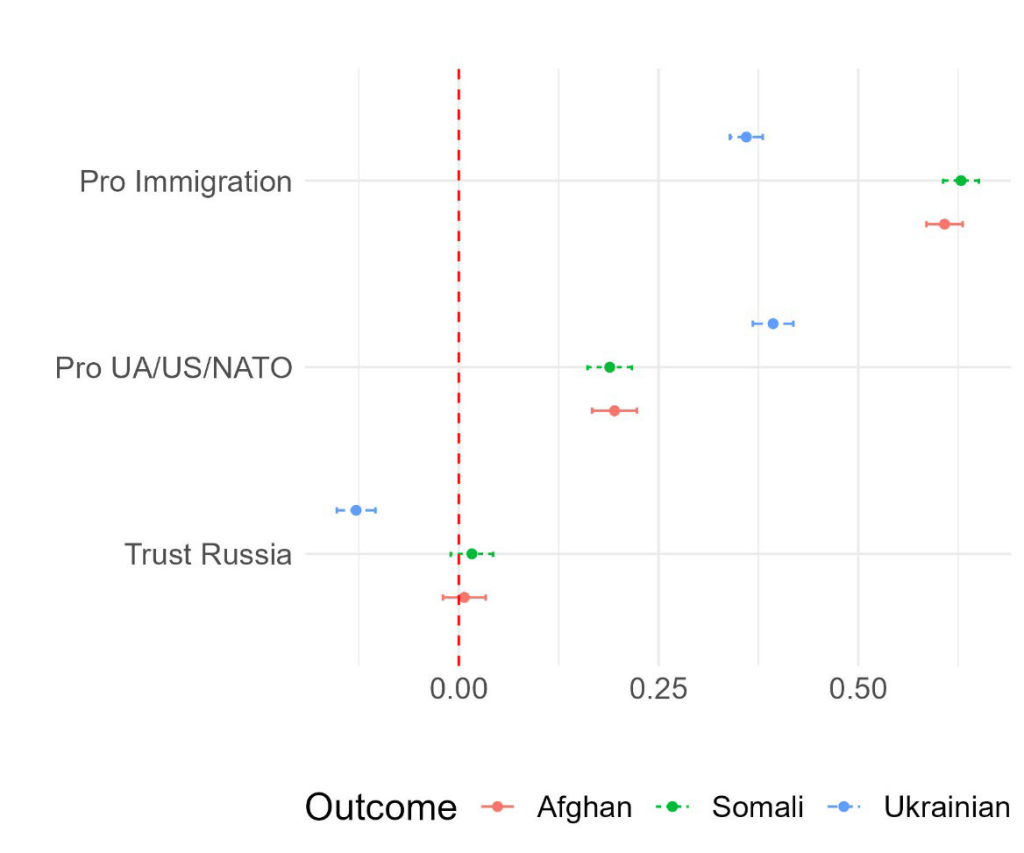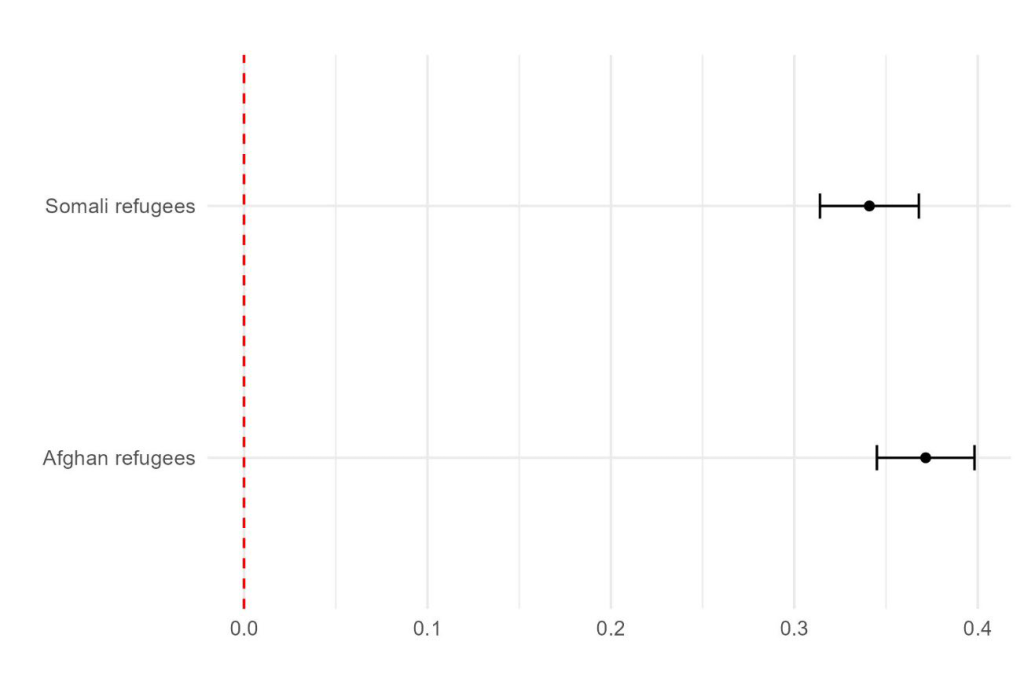Millions of Ukrainian refugees have entered the EU since Russia’s invasion of Ukraine in February 2022. Drawing on a new study, Alexandru D. Moise, James Dennison and Hanspeter Kriesi examine why Ukrainian refugees have received a warmer welcome from EU citizens than refugees from other countries.
Russia’s invasion of Ukraine generated a humanitarian crisis in the country. Since February 2022, on top of millions of Ukrainians that were internally displaced, over seven million Ukrainian refugees have entered the EU, out of which more than four million are registered for temporary protection, and thus entitled to residency, employment and social benefits in the EU.
This represents one of the largest refugee inflows into EU countries since the end of the Second World War. By comparison, the “refugee crisis” of 2015-16 saw the arrival of about 1.3 million Syrian (and other) refugees and migrants to Europe. This much smaller number of refugees generated a deep political crisis within and between member states.
Refugees and migrants became extremely politicised, as far right parties rode a wave of discontent and gained strength in national parliaments as well as in the European parliament, arguably contributing to the UK’s exit from the European Union. Countries closed their borders as some member states refused to even allow passage to refugees.
This stands in stark contrast to the overwhelmingly positive and depoliticised welcome of a much larger number of Ukrainian refugees since 2022. What explains this difference in acceptance of refugees and the muted political backlash to them? Was the initial reception of Ukrainian refugees an exceptional event, or do Europeans continue to support them? And how might these attitudes toward Ukrainian refugees impact attitudes toward other refugee groups? We investigate these questions in a recent study, where we analyse panel survey data from five EU countries: France, Germany, Hungary, Italy and Poland.
Why were Ukrainians received differently than other refugees?
In our survey, we asked respondents whether they would support the acceptance of refugees fleeing war from Ukraine, as well as from Afghanistan and Somalia. Figure 1 shows the average response on an eleven-point scale, with a red dashed line at five indicating mean positive support in a country, for the two time periods of our survey, March and July 2022.
Figure 1: Attitudes toward refugees from Afghanistan, Somalia and Ukraine
Note: For more information, see the authors’ accompanying paper in West European Politics.
We can see much higher support for Ukrainian refugees across all countries in both time periods. This matches the absence of political backlash to Ukrainians seeking refuge. There is a slight decline in this support from March to July. However, a majority still strongly show support.
The identity of refugees
The standard answer to the question of why Ukrainian refugees were received differently has to do with their identity and make-up. In contrast with previous refugee groups, Ukrainians are white and Christian, rather than Muslim. Most refugees are women and children, in contrast to higher proportions of young adult males in previous flows. In addition, Europeans might feel a shared sense of identity with Ukrainians due to their cultural similarity, geographical proximity and shared history. Moreover, the far right may therefore perceive them as less culturally threatening.
Figure 2: Predictors for attitudes toward Afghan, Somali and Ukrainian refugees
Note: For more information, see the authors’ accompanying paper in West European Politics.
We do not formally test for the role of prejudice or cultural similarity in our study, but we offer indirect evidence for the relevance of these factors. Figure 2 shows a simplified graph of our analysis showing the impact of immigration attitudes in general (predispositions to immigration) and a set of factors capturing attitudes to the West (trust in Ukraine, the United States and NATO) and trust in Russia. Overall, we see that predispositions to immigration and attitudes to the West have a similarly large effect on attitudes toward Ukrainian refugees. This matters because it shows how attitudes toward Ukrainian refugees were driven by factors far beyond generic predispositions to immigration.
The Russia-Ukraine war
Figure 2 also shows that attitudes to Ukrainian refugees are more strongly predicted by attitudes toward the war, which are – unsurprisingly – more weakly related (or not at all) to acceptance of Afghani and Somali refugees. This likely accounts for at least part of the difference between attitudes toward these groups.
Europeans feel involved in the Ukraine conflict in a way they may not in other conflicts. Europeans are also more aware of the war, due to extremely high media salience, and are therefore more likely to be aware of the suffering of Ukrainians. They are also more likely to feel moral sympathy for a neighbour who they feel was unjustly invaded in contrast to more ambiguous and poorer understandings of other sources of refugee flows. Simply put, the extraordinary situation of the war on their doorstep seems to have been a powerful reason for Europeans forming their views differently toward Ukrainians. As our findings show, when these attitudes toward the war shift, so do attitudes toward refugees.
How did attitudes toward Ukrainian refugees change over time?
We find a small decrease in support for Ukrainian refugees across time, with attitudes toward Afghans and Somalis being stable. Nonetheless, support remains high. We investigate the reasons for this shift in attitudes and find it is related to shifting attitudes toward the war and immigration. Both immigration attitudes and attitudes toward the war become slightly more negative over time (respondents become less welcoming and are less supportive of Ukraine and the West), thus leading to the small negative shift in attitudes toward refugees.
How did Ukrainian refugees influence attitudes toward other refugees?
One of the most surprising and consequential findings of our research is that there is a spill-over from attitudes toward Ukrainians to attitudes toward other refugee groups. Those who become more supportive of Ukrainians during the period also become more supportive of other refugee groups.
Figure 3: Spill-over effect from support for Ukrainians to support for other refugee groups
Note: For more information, see the authors’ accompanying paper in West European Politics.
Figure 3 shows the coefficient plot highlighting a substantial spill-over effect. We discuss several reasons for this effect. One might be general empathy. As Europeans emotionally reacted to the horrors of this specific war, they may have become more sensitive to individuals fleeing other war-torn areas.
A second possibility is cognitive dissonance as respondents may have felt a tension between their contrasting beliefs on Ukrainians, Afghans and Somalis in the four-month period between our surveys. Our research shows this effect to be robust. Further research can probe the mechanisms of this spill-over, as well as test how long-lasting it is on attitudes toward refugees.
For more information, see the authors’ accompanying open-access paper in West European Politics
Note: This article gives the views of the authors, not the position of EUROPP – European Politics and Policy or the London School of Economics. Featured image credit: Grand Warszawski/Shutterstock.com








It needs to be said, that the British Government gave no consideration whatsoever, to Ukrainians bringing
their racism towards Black People and other minorities, along with to Britain!
Some Ukrainian refugees, have even commented that there are too many black people in Britain. In my view, those Ukrainians who don’t want to mix with Blacks and other minorities, should simply, go back to Ukraine since they are the ones who are refugees and we pay our taxes, to bring them and keep them here!